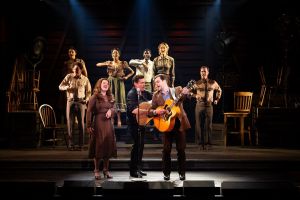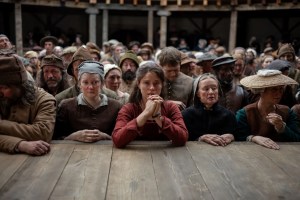The new stage adaptation of The Shawshank Redemption received its West End premiere on Sunday (13 September 2009, previews from 4 September) at Wyndham’s Theatre. The play, based on Stephen King’s 1982 novella Rita Hayworth and Shawshank Redemption which also inspired the 1994 Hollywood film starring Tim Robbins and Morgan Freeman, had its world premiere in May at Dublin’s Gaiety Theatre, and is now booking in London through to 14 February 2010.
American actors Kevin Anderson and Reg E Cathey lead the 20-strong cast as Andy Dufresne and Ellis Boyd “Red” Redding, two prison inmates who develop a life-long friendship after the former, a banker, is wrongly incarcerated for the murder of his wife. Cathey, who makes his London stage debut in the production, is a familiar face to TV fans from The Wire.
Paul Taylor in the Independent captured much of the critical consensus, noting that there’s no doubt “a large potential market for a stage version” but still questioning: “is there any artistic justification?” The answer, according to most, was, not really. Some felt that the stage production lacks a “sense of passing time” as it tries but fails to find “the right recurring rhythms”. Notably, Whatsonstage.com’s own Michael Coveney disagreed, who declared that “this clever stage adaptation” is as powerful as any prison drama since “Kenneth Brown’s The Brig in the mid-1960s”. There was more agreement with regard to the two “brilliant” lead actors, particularly Reg E Cathey.
Michael Coveney on Whatsonstage.com (four stars) – “The implicit irony of a prison play is that it celebrates the liberation of the human spirit, and this clever stage adaptation of Stephen King’s brilliant novella – the rights to the movie were unavailable – is as powerful as any such drama since Kenneth Brown’s The Brig in the mid-1960s … Both (actors) are terrific. And both embody lookalike aspects of Tim Robbins and Morgan Freeman in the movie – Red is in fact a white Irishman in the novella – but Anderson is less goofy and thoroughly, quietly convinced of his destiny, while Cathey comes home to roost in the audience’s affection with his own brand of twinkling humour and gravelly vocal delivery. The clanking prison cell designed by Ferdia Murphy on two levels contains a well-disciplined bunch of shirt-lifting hoodlums … Peter Sheridan’s production is a well-oiled machine with plenty of room for characters to manoeuvre, and the plot developments … are models of compressed and deeply affecting stage narrative. And the ending is simply glorious, even if the programme cover gives it away before you take your seat.”
Michael Billington in the Guardian (two stars) – “You read the book. You saw the movie. Now you can experience the play. Except I see no compelling reason, apart from the lead performances, why you should. For the main effect of this stage version by Owen O’Neill and Dave Johns, as proved by the chorus of boos that greeted the bad guys at the curtain call, is to turn the Stephen King novella into prison melodrama … What you have in Peter Sheridan‘s production is a straightforward tale of heroes and villains. I missed any sense of passing time: here, prison seems to offer a protection against the ravages of age. The main pleasure lies in the central performances. Kevin Anderson‘s Andy has just the right air of purposeful self-containment, as if any expression of emotion would be a sign of weakness. Reg E Cathey conveys Red’s growing trust in, and affection for, his grimly determined colleague. And Geoffrey Hutchings neatly captures the institutionalised solitude of Brooksie. But, lacking the movie’s excursions into the outside world and any sense of moral equivocation, the play, in the end, is The Shawshank Reduction.”
Charles Spencer in theDaily Telegraph (three stars) – “I would suggest that your cash might be better spent elsewhere … The blandly predictable design consists of little more than prison bars, and the tension and constantly simmering violence of the movie are in short supply. One can’t help but feel sympathy for Kevin Anderson, as Andy, and Reg E Cathey, as the prison’s fixer and philosopher, Red, who have the daunting task of following Robbins and Freeman at the top of their game. Both bear a passing resemblance to the more famous actors who preceded them, and both make a respectable fist of their task, but Anderson lacks the intense inwardness and enigmatic quality of Robbins, while Cathey, although engaging, lacks much of the charm, poetry and authority of Freeman’s narrator. There are a few points in favour of watching The Shawshank Redemption in a theatre, above all the warm feeling of community as an audience roots for the live actors on stage, that neither celluloid nor DVD can match. There’s also evocative use of folksy banjo music in Peter Sheridan’s efficient production … I also liked the mischievous touch of casting an actor who bears a strong resemblance to the theatre’s owner, Cameron Mackintosh, as the monstrously hypocritical, deeply corrupt Bible-basher of a prison governor. I just hope Cameron sees the funny side, too.”
Paul Taylor in the Independent– “There’s certainly a large potential market for a stage version, but is there any artistic justification? Not really … The writers, Owen O’Neill and Dave Johns, have argued that theatre is a medium that uses metaphor better than film. Their handling of this resource is shaky and limited … This results in disappointingly flimsy symbolism that’s designed to cover for the fact that you can’t show a man crawling down miles of sewage pipe on stage. Removing the flashback scenes and confining the action within bars is doubtless meant to reinforce the (tendentious) sense that prison is an emblem of the human condition. But the gravity of this notion is undermined by Ferdia Murphy‘s set which looks like a giant budgie cage. Crucially lacking is any palpable feel of the slow passage of time … But Peter Sheridan‘s production never finds the right recurring rhythms with which to convey this. Populated by unageing, ever-energetic cons, the entire feat of endurance seems to last for 12 months, tops … In the role of Red, the excellent Reg E Cathey (of Wire fame) has Morgan Freeman’s twinkle and rumbling, gravelly strength … He holds the evening together with his moving, unforced dignity.”
Benedict Nightingale in The Times (three stars) – “(The film) has become one of the cinema’s great sleepers, in some polls the most popular movie ever: which explains, yet doesn’t fully justify, the presence of Owen O’Neill and Dave Johns’ parallel adaptation of King in the West End … Ferdia Murphy’s set consists of stacks of steel bars, which adds to the claustrophobia and menace but means that little can be made of the closing scenes that occur outside. There’s a sadistic warder on show and a corrupt warden. Yet the feelgood element is never far away. Shawshank is far from a Scout camp, but male bonding is rife, along with uplifting sentiments about the importance of hope and dreams. Still, why not, since these involve not only a big, mild Anderson but the superb Cathey? His laidback growl and affable stoicism combine with a sly sense of mischief to make you believe that he knows how to play a system that, sadly, he’s unlikely to escape. And does he escape? Well, see this – or get the film on DVD.”
Henry Hitchings in the Evening Standard – “Owen O’Neill and Dave Johns have based their stage version … not on Frank Darabont’s film but on the Stephen King novella … Yet inescapably it is the popularity of the film that has triggered this adaptation and comparison feels apt … What defines the film is the central relationship … While Anderson and Cathey give robust performances, their chemistry lacks real spark. Anderson’s manner is often facetious instead of ingenious and Cathey’s gravity gruff rather than wise … Peter Sheridan’s direction is neat, maintaining a good sense of pace but the emotional register seems narrow … Although its heart-tugging ending assures a gale of applause, The Shawshank Redemption is decent entertainment, not a masterpiece.”












